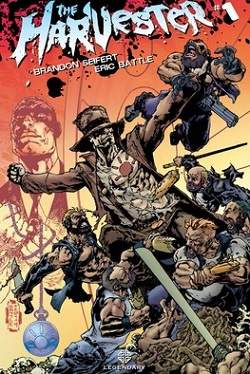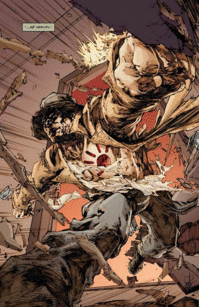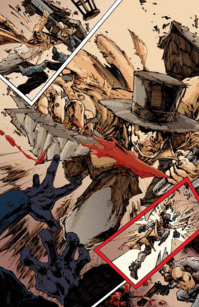New Comic Book Day: Brandon Seifert on The Harvester
 |
| Legendary Comics |
The Harvester is a new action book out this week from Legendary Comics. It’s written by Brandon Seifert (Hellraiser, Witch Doctor), with art by Eric Battle (The Flash, X-Men) and Lee Loughridge (literally everything). I had a chance to talk to Seifert about the comic and about working with Legendary, almost an upstart as a comic publisher despite its status as a very successful film company. AND I scored us some preview art!
Topless Robot: Tell me about Harvester.
Brandon Seifert: Harvester is an an issue that I’m doing from Legendary Comics. It was based on a concept that Thomas Tull, the CEO of Legendary, came up with, and it’s about this sort of supernatural…I don’t want to say vigilante character, but this supernatural agent of a greater metaphysical power that, I don’t want to go into what it is beforehand.
That’s one of the things that we kind of slowly reveal over the course of the series. It’s this supernatural agent of a greater physical power that needs things done on Earth, but for whatever reason either is unwilling or unable to get his hands dirty. So he is sort of almost this magical black ops operative of this metaphysical force. He’s been around for at least 150 years, killing people and wreaking havoc on behalf of what amounts to his employers. And over that time, all these urban legends and stories and folklore have grown up around him, as well as a substantial body count and a whole lot of unsolved mysteries. So we’re kind of introduced to the Harvester through the eyes of two people who are investigating him from different angles: one of them is investigating the folklore, and the other one is investigating it from more of the physical evidence – you know, police cases, newspaper reports, that kind of thing.
TR: So…I caught the kind of academic component – the history of folklore and the history of urban legend. How much are you going to play with that in the story?
Seifert: I did a whole bunch of research into that for it, but it ended up being more background stuff. There are some elements of that that get included over the course of the series, but most of the research that I ended up using, I think, went into that first issue kind of as a grounder and kind of as context for this character. My thought on this, and one of the reasons that the idea that Thomas essentially came up with that really intrigued me, was that if you have these supernatural forces in the world that are not publicly known, they are still going to leave physical evidence and they’re going to leave eyewitnesses. Similar to if UFOs are actually alien spaceships that the public doesn’t actually know about, there are still going to be reported sightings of them, and reports of physical evidence, and people believing them.
So it’s the same kind of thing with The Harvester. And so I always like to ground my fiction writing in as much reality as I can, because I think it makes it more plausible, and it also makes it more interesting for me. It gives it more detail and it gives it more texture. So most of the research that I did into that stuff ended up in the first issue.
 |
| Legendary Comics |
| Click to Embiggen |
TR: You mentioned that the Harvester is an agent of a supernatural power. Is the man in grey [the fingerwaved chap in the preview – Dernier Cri Dandeneau]also an agent, or is he the supernatural power, or is he just kind of pointing the gun?
Seifert: That’s a little ambiguous. There are a couple of different interpretations of him that are given over the course of the series. He is either the supernatural power or generally he seems more like another agent of it. He’s sort of, he’s not at the top of the food chain. He’s further up in the chain of command than the Harvester is. So he’s kind of the Harvester’s superior officer, commanding officer, but it seems unlikely that he’s actually the person or the force that the Harvester is working for.
TR: The Harvester himself, how much are we going to get into…is he going to get characterization? Is he going to be an antihero, or is he just kind of a tool?
Seifert: He’s kind of part antihero and kind of part…he definitely starts out as a tool or a weapon that’s kind of being pointed at people. And over the course of the series..he does have a character arc. He does have stuff that he needs to resolve and different approaches he needs to take to his past and the things that he’s asked to do. He’s definitely starting out as more of a tool, and more of a weapon, but he’s also kind of an antihero because he is doing really bad things in the service of something that appears to be a good cause.
That’s kind of a running theme or a running motif in the series, is that pretty much everyone in the series is doing bad things sooner or later, but all of them are doing them for good reasons. In issue 2, we introduce our kind of big bad, our kind of arch-nemesis figure for the series, and he is very much somebody who is doing terrible terrible things in the service of making the world a better place. Which is basically what the Harvester is doing as well.
TR: Some of your previous work has been horror with supernatural elements. Witch Doctor was a medical supernatural horror book, you did straight up horror on Hellraiser [The Road Below]. There’s definitely a horror vibe to Harvester, but it does feel a little bit more like a straight up action book tinged with some supernatural elements. Is it going to be a lot of punchsplode or are there going to be some scares worked in too?
Seifert: You pretty much nailed it. One of the things that Thomas Tull was very clear and upfront about, and something that we talked about repeatedly was that he was very aware that The Harvester could be taken very much into a horror place, but that wasn’t really what he was interested in. He did want it to be a more action oriented series tinged with the supernatural and the kind of horror elements. So it is kind of horror-flavored without being straight up horror. There’s very little in it that’s me trying to scare or disturb the reader. It is much more kind of, I would say that it’s an adrenaline rush. I think horror frequently is, too, but it’s a different kind of an adrenaline rush. It’s more of the roller coaster ride, less of the haunted house.
TR: So Legendary’s been a comic publisher for a while, but they’ve been making a pretty big push in the last year or so with a lot of original content. How has working with them been?
Seifert: Working with them has been really fun, and for me it’s been very different because Legendary is a very large, successful movie company, movie production company. And previously, almost all of my comics work had been with more traditional kind of comics publishers, which are much smaller operations. They’re focused pretty much entirely on making comics, whereas Legendary has its comics wing, its comics division, but overall they are a movie company. So it’s been very interesting for me, the differences. It’s a very different kind of experience working for Legendary than working for smaller comics publishers whose focus is different and who have a lot fewer people on staff and have much smaller budgets. It’s been really kind of liberating, working for Legendary.
 |
| Legendary Comics |
| Click to Enlarge |
TR: What comic influences are you drawing from? What comic book and pop culture stuff are you filtering through to write the story of the Harvester?
Seifert: For me, I think I’m kind of weird as far as comics writers go, because I’m somebody who really loves comics, and I have a lot of comic series that I’m really into and that I really love, but when I’m coming up with new comic series or developing different comics ideas, I tend to not reference a lot of other comics. I’m much more likely to reference either movies and TV or, we talked about earlier, the real world non-fiction folklore research that I did for the project. I do a lot of research into real world things for whatever project I’m working on. For something like The Harvester, it’s actually…much lighter on direct influences than most of my projects are.
Something like Witch Doctor, it’s really heavily influenced by a whole bunch of different things, a whole bunch of different tv shows and movies and some comics too. Whereas The Harvester, there were a few different kind of touchstones for me, a few different things that I went back and watched or read, either because of kind of plot or character tropes or ideas that we were kind of touching on, or because thematically or tone-wise they linked up with The Harvester. So for me I think the main through things were, I went back and watched Clive Barker’s Candyman, which I quite like.
In my head, one of the ways I think of the Harvester is Candyman meets Superman, where he’s kind of this super-heroic figure, and kind of also this magical serial killer at the same time. The Crow was another one. And then there were a couple of westerns that I went and watched. I think it probably, it was a couple of years ago when I was doing the initial research on this project. I think I watched some of the Man with No Name ones. Those were because of Thomas Tull, like, he had a very kind of, a lot of the things that he was referencing for this supernatural action series were westerns. Like he had wanted it to have a very western feel, and he wanted the Harvester to be the kind of strong silent loner kind of type that you see in a lot of spaghetti westerns and stuff like that. so I went back and watched a few of those, too for it.
TR: How has working with Eric Battle been?
Seifert: It’s been really good. The project’s been under development for several years and Eric actually came in pretty late in the game. And he’s just been stellar. It’s been really good working with him. He’s pleasant and reliable and really talented, which is, you don’t really get better than that. What else can I really ask for? And then his style, I think, really syncs up well with what we’re trying to do on the book. He’s got kind of a, it’s something that is sort of traditional super hero-ish, or traditional super hero influenced, but it’s also darker and rougher, and I think that works really well for the project.
TR: And Lee Loughridge’s colors over it have kind of really managed to hold on to the darkness while at the same time not being like, muddy or impenetrable.
Seifert: Yeah, I really like how the colors are turning out. that’s an issue that I have with a lot of horror comics or a lot of darker, grittier comics. They get muddy. There are a lot of browns. It’s very muted. And I really like that we got a book that’s kind of in a similar state, but that looks very very different, that has a lot of bright colors and stuff.
TR: So you mentioned that the next issue, issue 2 we see the reveal of the big bad behind the whole series. Can you talk a little bit more about issue 2 and maybe a little bit longer term into the series?
Seifert: Yeah…I don’t want to spoil too much of it. I don’t want to reveal too much, but our big bad is sort of, he’s sort of the Lex Luthor. If the Harvester is almost a Superman figure, then this is kind of his Lex Luthor…The Harvester, his abilities are, they’re magical, they come from outside of himself, and they’re very physical. He is strong in a bunch of physical ways, whereas his antagonist for the series is somebody who, his abilities and his attributes are mental, or intellectual. They come from inside himself. He’s kind of a self made man. He’s not empowered by some other force.
And like I mentioned earlier, they are both people, The Harvester and his nemesis, his antagonist in the series, are both people who are doing really bad things and killing people, but are doing it for good reasons, and kind of in service of noble causes. And so that dichotomy is really interesting – why is the Harvester the hero of the book? And his antagonist, why is his antagonist the villain of the book when they’re both killing people to help other people out? That’s one of the things that I find really interesting about the series.
TR: Great! Thank you very much for taking the time to talk with me!
********************************************************************************************************
As you can probably guess, I enjoyed The Harvester a lot. The art is vibrant and graphic, with a sneaky emphasis on horror. The writing is smart, and Seifert’s enthusiasm for the project, even fighting through a cold, was clear and infectious. Like his cold.
Shit, I’m gonna get his cold, aren’t I?
You can pick up The Harvester #1 at your friendly local comic shop or online via Comixology.
I’m also checking out Darth Vader #1, Help Us! Great Warrior #1, Headspace #6, and Uber #22, and wailing about the end of X-Force while I try and rip through a bunch of Batman Eternal issues.
What are you reading this week?

